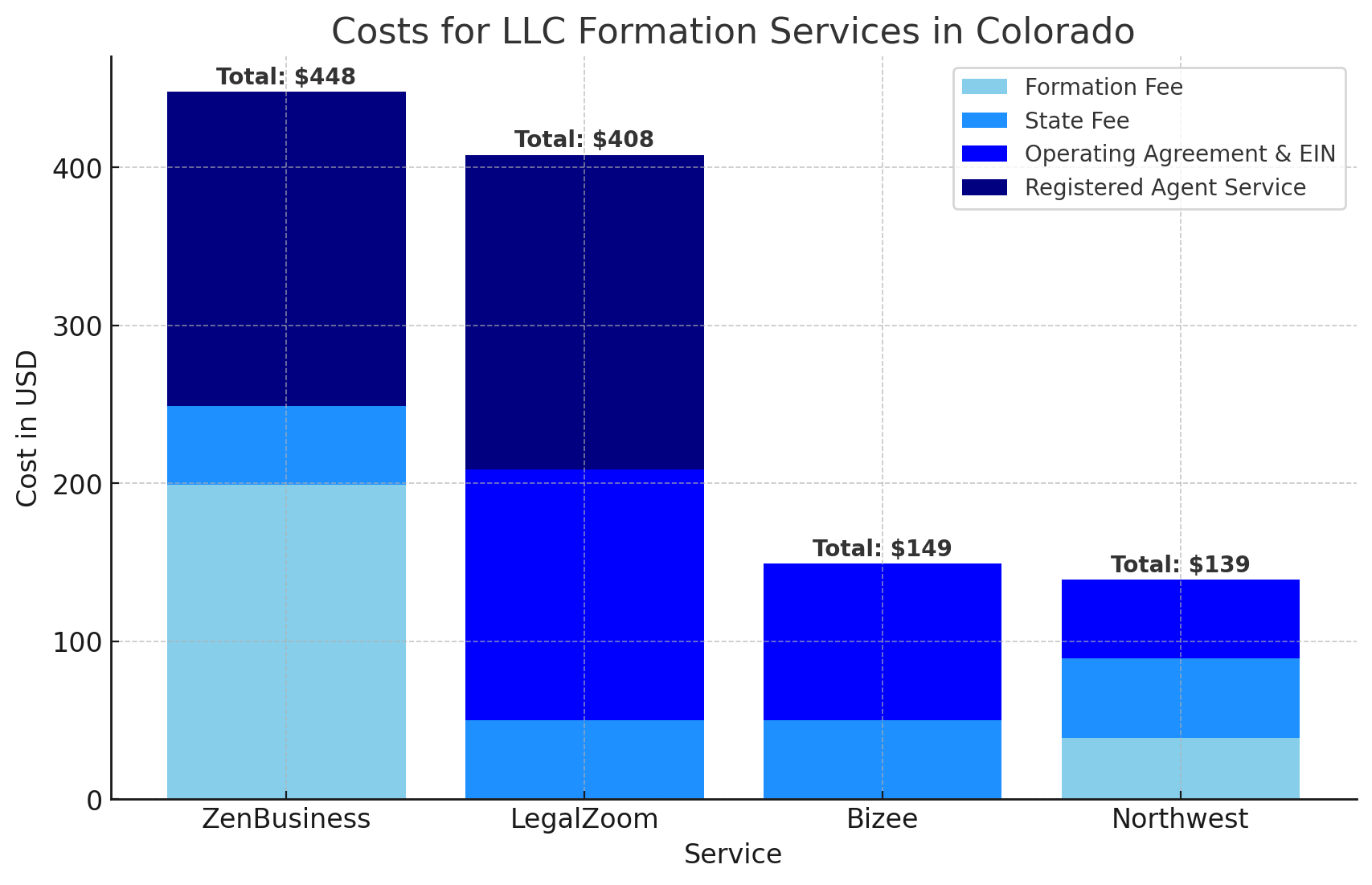Thinking of launching your business in Colorado? Establishing a Limited Liability Company (LLC) is a fundamental step toward making your entrepreneurial dreams a reality.
This guide is designed to demystify the process of forming your LLC in Colorado, presenting each step in a straightforward and easy-to-understand manner. Whether you're a first-time founder or an experienced businessperson, this article will guide you through the critical aspects of Colorado LLC formation.
Options for Forming an LLC in Colorado
- Do-It-Yourself (DIY): Ideal for those comfortable with legal procedures and prefer handling matters independently.
Go to the Colorado Secretary of State’s website to set up the LLC and then to the IRS’s website to get your EIN (Employer Identification Number). - Hiring a Lawyer: Best for obtaining personalized legal advice, especially in intricate scenarios.
- Using a Formation Service: An efficient, budget-friendly choice for many. Notable services include ZenBusiness, LegalZoom, Bizee, and our top pick, Northwest Registered Agent.

This guide aims to provide clear and expert guidance at each phase of your Colorado LLC formation journey.
Steps to Form an LLC in Colorado
- Choose Your LLC’s Name: The name must be distinctive in Colorado and include “Limited Liability Company” or its abbreviations.
Complying with Colorado’s naming guidelines is essential. Colorado’s rules for naming LLCs are detailed in CO Rev Stat §7-90-601. - Designate a Registered Agent: Colorado law mandates appointing a registered agent with a physical address in the state for managing your LLC's legal paperwork.
- File the Articles of Organization: Submit this crucial document to the Colorado Secretary of State. It includes your LLC’s name, address, registered agent, and management structure. The filing fee is $50 online.
- Draft an Operating Agreement: Although not legally required in Colorado, an operating agreement is crucial for detailing your LLC's operational and management plans.
- Obtain an Employer Identification Number (EIN): Necessary for tax and employment purposes. This can be obtained from the IRS website.
- Open a Business Bank Account: Separate your personal and business finances by establishing a bank account specifically for your LLC.
- Fund Your LLC: Inject capital into your business via personal investments, loans, or other funding sources.
- Ongoing Compliance: Regularly file a Periodic Report and pay the $10 fee to maintain your LLC's good standing with the state.
Establishing Your LLC with Northwest Registered Agent
Northwest Registered Agent streamlines the LLC formation process. By clicking on the button below, you can use our affiliate link
and form your LLC in Colorado for only $39, plus state fees. This exclusive offer includes their registered agent service free for the first year, adding extra value and savings for your new venture.
We get commissions for purchases made through links in this post.
Legal Considerations and Compliance in Colorado
It's critical to comply with Colorado-specific regulations. Ensure your LLC name adheres to state criteria and maintain a readily accessible registered agent during business hours. Filing your Periodic Report annually is vital for keeping your LLC compliant.
Benefits of Forming an LLC in Colorado
A Colorado LLC offers limited liability protection, potential tax benefits, and operational flexibility. The state’s conducive business environment provides ample opportunities for growth in various sectors.
Common Mistakes to Avoid
Avoid errors like neglecting legal responsibilities or mixing personal and business finances. Stay informed, adhere to state laws, and consider professional services when necessary.
Next Steps After Establishing Your LLC
Post-formation, focus on developing a robust business plan, setting up effective accounting systems, and marketing your offerings. Utilize tools and services for efficient business management to ensure a fruitful journey.
Conclusion
Forming an LLC in Colorado offers different paths, each with unique advantages. Entrepreneurs may choose DIY, legal assistance, or services like Northwest Registered Agent for their efficiency and affordability. They simplify the setup process, ensuring your LLC is established correctly and promptly.
Start an LLC in Colorado FAQs
Can you be your own registered agent in Colorado?
Yes, but if you act as your own registered agent in Colorado, your name and address will be publicly listed. You'll need to be available during regular business hours to receive any legal documents in person.
Can I change my registered agent after I start an LLC?
Yes. To change your registered agent in Colorado, use this link. You will need to file a Statement of Change Changing the Registered Agent Information. To do this, you’ll first need to find your business using the Record Identification or ID Search. Once you select your business, you’ll be taken to the appropriate form. There is a $10 filing fee.
What’s the difference between a member-managed and manager-managed LLC?
If you go for a member-managed LLC, the members (owners) will handle the day-to-day operations. In a manager-managed LLC, members hire managers to run things. These managers take care of tasks such as hiring and firing employees, managing credit and bank accounts, and signing agreements and contracts.
What should be included in an operating agreement?
A personalized operating agreement addresses both the day-to-day and overarching aspects of your company, encompassing everything from member responsibilities to the dissolution of the business. Here are common topics typically included in operating agreements:
- Initial investments
- Profits, losses, and distributions
- Voting rights, decision-making powers, and management
- Transfer of membership interest
- Dissolving the business
Do I need an EIN for my Colorado LLC?
Yes, you need an EIN if your business has employees, is a multi-member LLC, or is taxed as a corporation. Even if your LLC isn't legally obligated to have an EIN, it's advisable. An EIN allows you to open bank accounts, apply for business licenses, and is generally essential for business operations. It also helps keep your Social Security Number (SSN) private during business transactions.